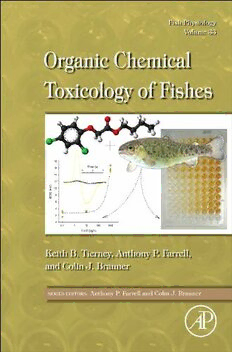
Organic Chemical Toxicology of Fishes PDF
Preview Organic Chemical Toxicology of Fishes
ORGANIC CHEMICAL TOXICOLOGY OF FISHES This is Volume 33 in the FISH PHYSIOLOGY series Edited by Anthony P. Farrell and Colin J. Brauner Honorary Editors: William S. Hoar and David J. Randall A complete list of books in this series appears at the end of the volume ORGANIC CHEMICAL TOXICOLOGY OF FISHES Edited by KEITH B. TIERNEY DepartmentofBiological Sciences University ofAlberta Edmonton, Alberta Canada ANTHONY P. FARRELL Department ofZoology,and Facultyof LandandFoodSystems The University of BritishColumbia Vancouver,British Columbia Canada COLIN J. BRAUNER DepartmentofZoology The University of BritishColumbia Vancouver,British Columbia Canada AMSTERDAM(cid:1)BOSTON(cid:1)HEIDELBERG(cid:1)LONDON NEWYORK(cid:1)OXFORD(cid:1)PARIS(cid:1)SANDIEGO SANFRANCISCO(cid:1)SINGAPORE(cid:1)SYDNEY(cid:1)TOKYO AcademicPressisanimprintofElsevier AcademicPressisanimprintofElsevier 32JamestownRoad,LondonNW17BY,UK 225WymanStreet,Waltham,MA02451,USA 525BStreet,Suite1800,SanDiego,CA92101-4495,USA Copyrightr2014ElsevierInc.Allrightsreserved Thecoverillustratesthediversityofeffectsanexamplesyntheticorganicwaterpollutantcan haveonfish.Thechemicalshownis2,4-D,anherbicidethatcanbefoundinstreamsnear urbanizationandagriculture.Thefishshownisonethatcanliveinsuchstreams:rainbowtrout (Oncorhynchusmykiss).Theeffectshownontheleftistheabilityof2,4-D(yellowline)to stimulateolfactorysensoryneuronsvs.control(blackline)(measuredasanelectro- olfactogram;EOG).Theeffectshownontherightistheabilityof2,4-Dtoinducethe expressionofaneggyolkprecursorprotein(vitellogenin)inmalefish.Imagecredits:chemical, Wikipedia;fish,MatthewGilbert;EOG,BrianBlunt;wellplate,DanielSchlenk. Nopartofthispublicationmaybereproduced,storedinaretrievalsystemortransmittedinany formorbyanymeanselectronic,mechanical,photocopying,recordingorotherwisewithoutthe priorwrittenpermissionofthepublisher PermissionsmaybesoughtdirectlyfromElsevier’sScience&TechnologyRights DepartmentinOxford,UK:phone(þ44)(0)1865843830;fax(þ44)(0)1865853333;email: [email protected],visittheScienceandTechnologyBookswebsiteat www.elsevierdirect.com/rightsforfurtherinformation Notices Noresponsibilityisassumedbythepublisherforanyinjuryand/ordamagetopersonsor propertyasamatterofproductsliability,negligenceorotherwise,orfromanyuseoroperation ofanymethods,products,instructionsorideascontainedinthematerialherein Becauseofrapidadvancesinthemedicalsciences,inparticular,independentverificationof diagnosesanddrugdosagesshouldbemade BritishLibraryCataloguing-in-PublicationData AcataloguerecordforthisbookisavailablefromtheBritishLibrary LibraryofCongressCataloging-in-PublicationData AcatalogrecordforthisbookisavailablefromtheLibraryofCongress ISBN:978-0-12-398254-4 ISSN:1546-5098 ForinformationonallAcademicPresspublications visitourwebsiteatstore.elsevier.com TypesetbyMPSLimited,Chennai,India www.adi-mps.com PrintedandboundinUnitedStatesofAmerica 14 15 16 17 10 9 8 7 6 5 4 3 2 1 For Jeannie CONTENTS CONTRIBUTORS xi ABBREVIATIONS AND ACRONYMS xv PREFACE xxiii 1. Organic Contaminants and Fish Keith B. Tierney, Christopher J. Kennedy, Frank Gobas, Melissa Gledhill and Mark Sekela 1. Contaminants:AShortHistoricalPreamble 1 2. ContaminantToxicokineticsinFishes 14 3. PredictingContaminantMovementintheEnvironmentandFish 34 4. QuantifyingContaminantsandExposures 40 5. Conclusion 41 2. Effects of Legacy Persistent Organic Pollutants (POPs) in Fish—Current and Future Challenges Lyndal L. Johnson, Bernadita F. Anulacion, Mary R. Arkoosh, Douglas G. Burrows, Denis A. M. da Silva, Joseph P. Dietrich, Mark S. Myers, Julann Spromberg and Gina M. Ylitalo 1. Introduction 54 2. TransformationsofPOPsintheAquaticEnvironment 56 3. EndocrineDisruption 58 4. EffectsonEarlyDevelopment 77 5. TransgenerationalEffects 84 6. EffectsonGrowth,Condition,andEnergyReserves 87 7. EffectsonReproduction 90 8. Immunotoxicity 97 9. NeoplasiaandRelatedPathologicalConditions 102 10. EffectsonBehavior,IncludingForaging,Aggression,and PredatorAvoidance 105 11. RiskAssessmentChallenges 108 vii viii CONTENTS 3. Organometal(loid)s Niladri Basu and David M. Janz 1. Introduction 142 2. OrganicMercury 144 3. Organoselenium 157 4. Organoarsenicals 170 5. OrganotinCompounds 176 6. OtherOrganometal(loid)s 179 7. Conclusions 181 4. Effects on Fish of Polycyclic Aromatic Hydrocarbon (PAH) and Naphthenic Acid Exposures Tracy K. Collier, Bernadita F. Anulacion, Mary R. Arkoosh, Joseph P. Dietrich, John P. Incardona, Lyndal L. Johnson, Gina M. Ylitalo and Mark S. Myers 1 Introduction 196 2 TransformationsofPAHsintheAquaticEnvironment 198 3 HepaticNeoplasiaandRelatedLesionsinWildFish 200 4 EffectsonReproduction 211 5 EffectsonEmbryonicandLarvalDevelopment 215 6 TransgenerationalEffects 222 7 OtherEffectswithConsequencesforSurvivalofPostlarvalStages 224 8 NaphthenicAcidsasaNewConcern 230 9 FutureDirections 234 5. Estrogenic Endocrine Disrupting Chemicals in Fish Christopher J. Kennedy, Heather L. Osachoff and Lesley K. Shelley 1. Introduction 257 2. EDC 260 3. Toxicokinetics 266 4. MechanismsofToxicity 273 5. XenoestrogenEffects 285 6. InteractionswithOtherToxicAgents 290 7. KnowledgeGapsandFutureDirections 291 6. Insecticide Toxicity in Fish M.H. Fulton, P.B. Key and M.E. DeLorenzo 1. Abstract/Introduction 310 2. Background 311 3. InsecticideClasses 312 4. Organophosphates 323 5. Carbamates 331 6. Pyrethroids 337 7. Neonicotinoids 345 ix CONTENTS 8. Phenylpyrazoles 347 9. Microbial-BasedInsecticides 349 10. InsectGrowthRegulators 351 11. Mixtures 353 12. DataGaps 353 13. Summary 354 7. Effects of Herbicides on Fish Keith R. Solomon, Kristoffer Dalhoff, David Volz and Glen Van Der Kraak 1. Introduction 370 2. ClassificationofHerbicides 374 3. AcuteLethalityofHerbicidestoFish 374 4. SublethalEffectsofHerbicidesinFish 387 5. IndirectEffectsofHerbicidesonFish 402 6. Conclusions 403 8. Personal Care Products in the Aquatic Environment: A Case Study on the Effects of Triclosan in Fish Alice Hontela and Hamid R. Habibi 1. Introduction 412 2. PhysicalandChemicalPropertiesofTriclosan,andItsUseasa PersonalCareProduct 413 3. ExposureintheAquaticEnvironment 415 4. KineticsandMetabolismofTriclosan 417 5. ToxicityofTriclosan 418 6. ReproductiveandDevelopmentalEffects 423 7. EffectsofTriclosanontheThyroidAxis 425 8. InteractionsofTriclosanwithArylHydrocarbonandRyanodineReceptors426 9. FutureUseofTriclosanandRelatedEnvironmentalIssues 428 10. ConclusionsandKnowledgeGaps 429 11. GeneralLessonsLearnedfromtheCaseStudyofTriclosan 431 9. Emerging Threats to Fishes: Engineered Organic Nanomaterials Tyson J. MacCormack, Greg G. Goss and Richard D. Handy 1. Introduction 439 2. TheEnvironmentalChemistryofEngineeredNanomaterialsand BioavailabilitytoFishes 443 3. AcuteToxicityofOrganicENMs 445 4. UptakeRoutesandTargetOrgansforOrganicENMs 445 5. EffectsofOrganicENMsonthePhysiologicalSystemsofFishes 451 6. StudiesonOrganicENMsandCappingAgents 458 7. NanocrystallineandNanofibrillarCellulosicMaterials 463 8. Polymer-coatedENMsintheAgriculturalSector 465 9. KeyNeedsinEnvironmentalRiskAssessmentofOrganicENMs 466 10. ConclusionsandPerspectives 469 x CONTENTS 10. Handling Fish Mixture Exposures in Risk Assessment Dick de Zwart and Leo Posthuma 1 Introduction 482 2 FishandMixtures 485 3 PrinciplesofRiskandImpactAssessmentofChemicalsandMixtures 488 4 CumulativeRiskAssessmentforMixturesofToxicants 500 5 EvidenceforMixtureImpactsintheField 512 6 Conclusions,Overview,andSummary 519 INDEX 525 OTHERVOLUMESINTHEFISHPHYSIOLOGYSERIES 543 COLORPLATESECTION CONTRIBUTORS The numbers in parenthesis indicate the pages on which the authors contributions begin. BERNADITA F. ANULACION (53, 195), Environmental and Fisheries Science Division, Northwest Fisheries Science Center, National Marine Fisheries Service, National Oceanic and Atmospheric Administration, Seattle, WA, USA MARY R. ARKOOSH (53, 195), Environmental and Fisheries Science Division, Northwest Fisheries Science Center, National Marine Fisheries Service, National Oceanic and Atmospheric Administration, Newport, OR, USA NILADRI BASU (141), Department of Environmental Health Sciences, University of Michigan, Ann Arbor, MI, USA DOUGLASG.BURROWS(53),EnvironmentalConservationDivision,Northwest Fisheries Science Center, National Marine Fisheries Service, National Oceanic and Atmospheric Administration, Seattle, WA, USA TRACY K. COLLIER (195), Science Director, Puget Sound Partnership, Tacoma, WA, USA DENIS A.M. DA SILVA (53), Environmental and Fisheries Science Division, Northwest Fisheries Science Center, National Marine Fisheries Service, National Oceanic and Atmospheric Administration, Seattle, WA, USA DICK DE ZWART (483), RIVM, Centre for Sustainability, Environment and Health, The Netherlands MARIE E. DELORENZO (309), Center for Coastal Environmental Health and Biomolecular Research, National Ocean Service, National Oceanic and Atmospheric Administration, Charleston, SC, USA xi
